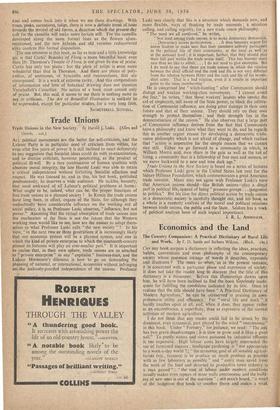Trade Unions
At.t- political movements are the better for self-criticism; and the Labour Party is in partipular need of criticism from within, for even after five years of power it is still inclined to react defensively to any suggestion that Socialist ideas could do with re-examination, and to dismiss criticism, however penetrating, as the product of political ill-will. By a rare combination of human qualities with absolute moral• integrity, the late Harold Laski was able to retain a critical independence without forfeiting Socialist affection and respect. He was listened to, and in this, his last book, published posthumously, he deserves a wide audience. He tackles, honestly, that most awkward of all Labour's political problems at home: What ought to be, indeed, what can be, the proper functions of free trade unions in a planned society ? In Russia the trade unions have long been, in effect, organs of the State, for although they undoubtedly have considerable influence on the working out of social policy, it is, as Professor Laski observes, " influence, but not power." Assuming that the virtual absorption of trade unions into the mechanism of the State is not the future that the Western working man would like to see, how are the unions to adapt them- selves to what Professor Laski calls " the new society " ? In his view, " in the next two or three generations it is increasingly likely that our economic system will be a planned system, and one in which the kind of private enterprise to which the nineteenth-century pinned its fortunes will play an ever-smaller part." It is important to realise that, in their own sphere, trade unions are as attached to " private enterprise " as any capitalist " business-man, and the Labour Movement's dilemma is how to go on demanding the planning of national, or international, 'economies without infringing on; the jealously-guarded independence of the unions. Professor
Laski sees clearly that this is a situation which demands new, and more flexible, ways of thinking by trade unionists ; a situation calling, and calling urgently, for a new trade union philosophy.
" The need we all confront," he writes,
" Not least among trade unions, is to make democracy demochtti,:. ... Democracy means participation.. .. It thus becomes urgent for union leaders to make sure that their members actively participate in the political life of their community, at the local as well as at the national level ; it is important, further, that they should play their full part within the trade union itself. This has become more rare than we like to admit.... I do not need to give examples. But I do need to say that there are trade unions in which the relation between the chief official and the rank and file is not very different from the relation between Hitler and the rank and file of his brown- shirt army. That is a bad relation, even if it results in important gains to the mass membership."
He is concerned lest " witch-hunting " after Communists should disrupt and weaken working-class movements. " I cannot avoid the fear," he writes, " that those workers' leaders who invoke the aid of employers, still more of the State power, to block the infiltra- tion of Communist influence, are doing great damage to their own future and that of their unions. They should rely on their own strength to protect themselves ; and their strength lies in the democratisation of the unions." He also observes that a large part ,,,of Communist influence derives from the fact that Communists have a philosophy and know what they want to do, and he regards this as another urgent reason for developing a democratic trade- union philosophy which is not afraid of change, and which realises that " action is imperative for the simple reason that we cannot stay still. Either we go forward to a community in which, as William Morris said, men share in the gain as well as the toil of living, a community that is a fellowship of free men and women, or we move backward to a new and iron dark age."
Trade Unions in the New Society is based on a series of lectures which Professor Laski gave in the United States last year for the Sidney Hillman Foundation, which commemorates a great American trade unionist. Many may not agree with Professor Laski's view that American unions should—like British unions—play a direct part in political life, instead of being " pressure groups ... tangential to politics." But his case for direct political action by trade unions in a democratic society is carefully thought out, and his book as a whole is a masterly analysis of the moral and political relations between trade unions, the public and the State. Seldom has a work of political analysis been of such topical importance.
J. R. L. ANDERSON.














































 Previous page
Previous page